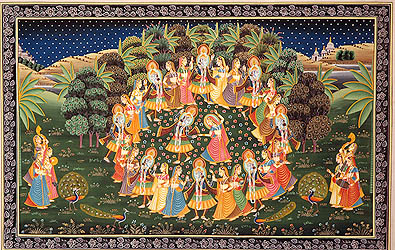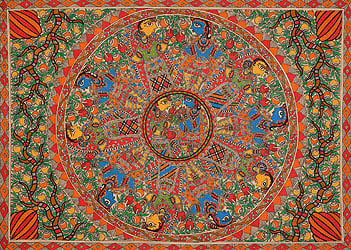One uniqueness of our Vedic religion is that it allows for salvation not only through renunciation (nivritti) but also through the path of material happiness (pravritti). We can certainly enjoy material happiness, but it should be within the ambit of dharma. If we resort to adharma in order to satisfy our desire, i.e. kama, it will surely end up in causing utter sorrow definitely for us and perhaps for others too. For example, conjugal pleasure with our life-long partner is dharma because while it satisfies our natural urges born out of samskaras, it does not put us away from the path of moksha. Indeed, a joint pious life is conducive to take us towards the path of moksha, even though we may not be aspiring for it immediately. On the other hand, the same pleasure out of wedlock is adharma, which ultimately lands us and our kin in grief.
 |
 https://www.exoticindia.com/product/paintings/rasa-lila-of-krishna-with-gopis-WL25/ https://www.exoticindia.com/product/paintings/rasa-lila-of-krishna-with-gopis-WL25/ |
This episode was being narrated by the sage Shuka to king Parikshit. At the end of the narration, the king raised the same doubt as above.Then the saint answered: ' Tejiyasam na doshaya - No fault in this for the tejiyans' and concluded that indeed, the next morning their husbands saw the gopis just sleeping by their side.
So the clarification hinges on the word tejiyan and its meaning should be internally consistent with the description of the Rasa. Notice that nobody will be washing clothes or cooking, or feeding or eating in the dead of the night. Lotuses also do not bloom at night. And the little boy Krishna would never munch tambula (betel leaf). Also notice that the next morning their husbands saw the gopis just sleeping by their side. This gives us a clue that the Rasa was dream. This is confirmed as follows:
'Tejiyan' means more lustrous according to Panini's grammar. Who is more lustrous than whom? Upanishads call the jiva in waking state as Vishwa and the dreaming jiva as Taijasa (Mandukya Upanishad Mantras 3-4). This Taijasa is tejiyan - more lustrous than Vishwa. Therefore, the sage Shuka's reply means that there is no fault in the activities of the dreaming gopis. This is exactly what the Brihadaranyaka Upanishad says. For that matter, we all know it ourselves. Nobody deprecates anyone for the faults committed by him in his dreams. Why? Because, while the external world keeps the mind under leash, it becomes totally free during dreams. So, the mind mixes the experiences of the real world with wild imaginations and creates the dream. The little boy Krishna can talk and behave as an adult and can even chew a betel leaf; lotuses can bloom at night. Nevertheless, He has to admonish the gopis for their conduct!



No comments:
Post a Comment